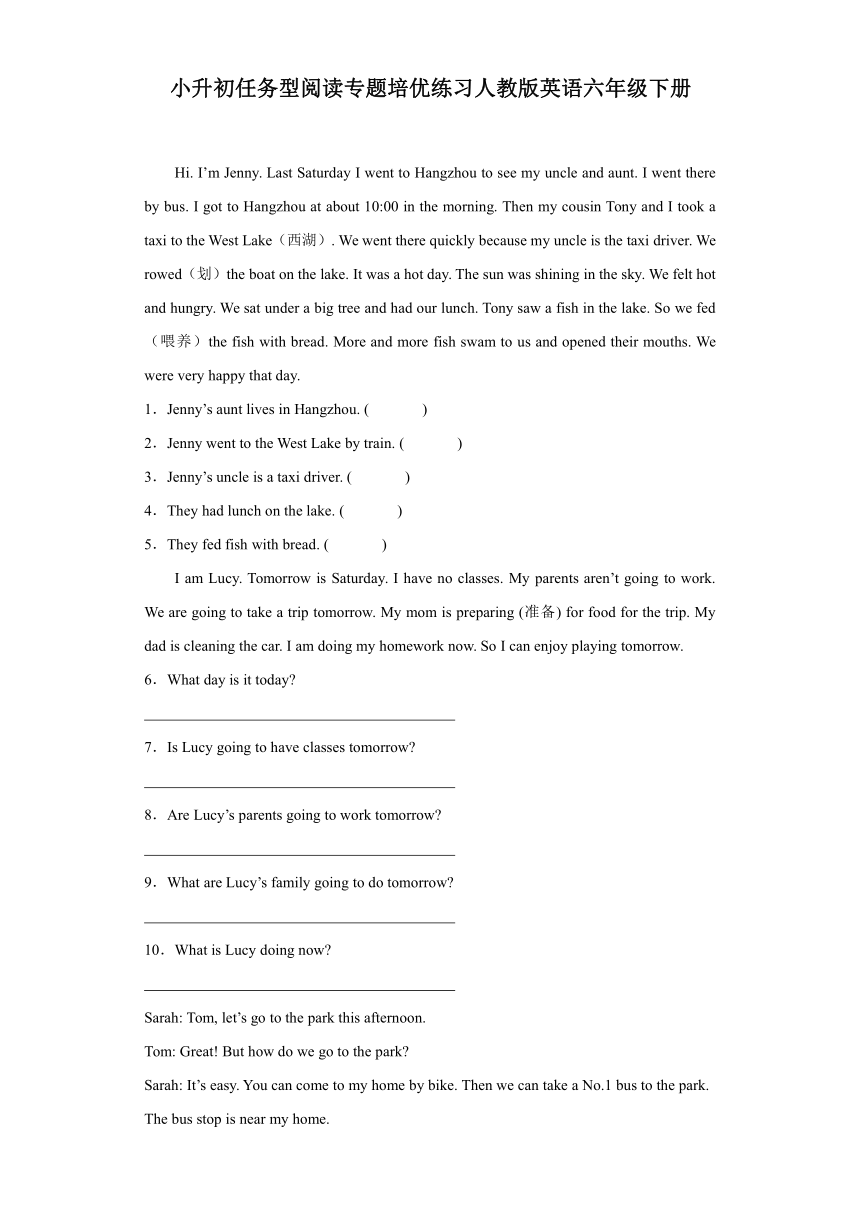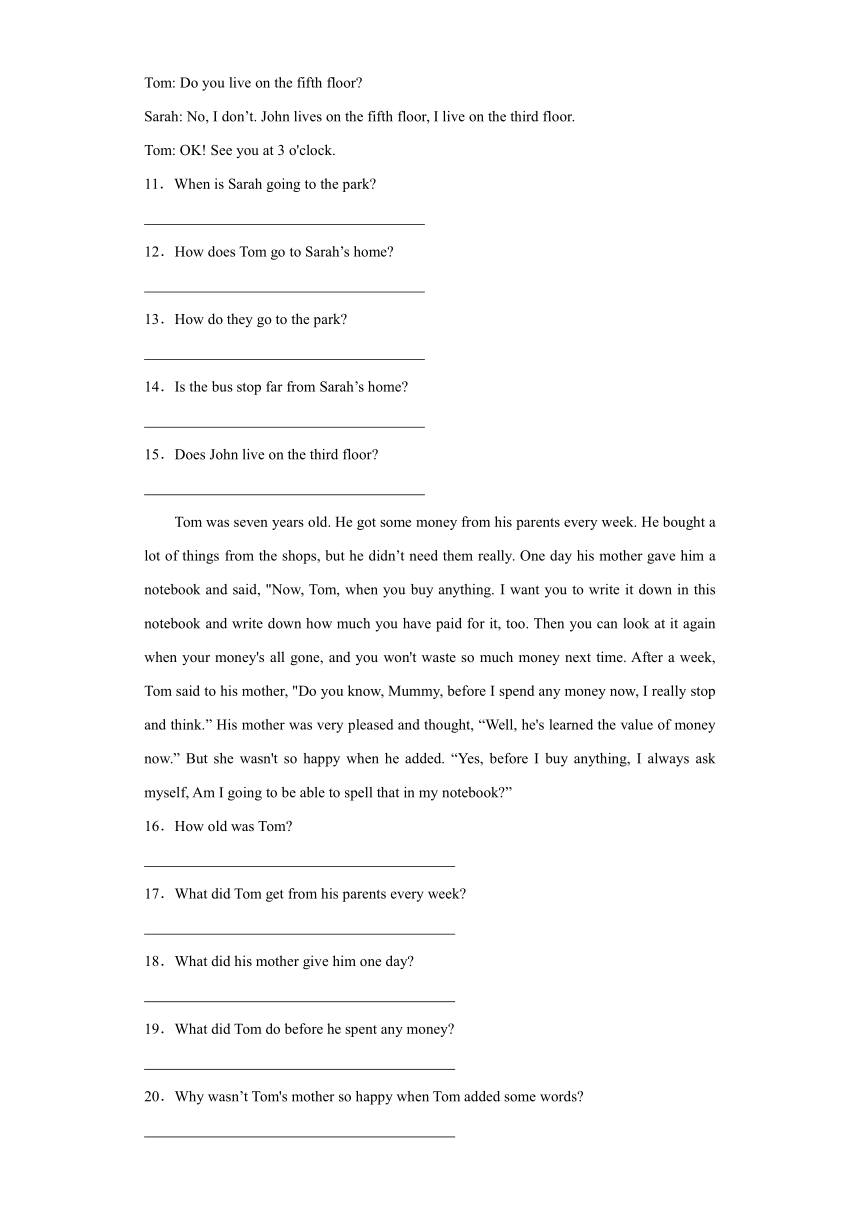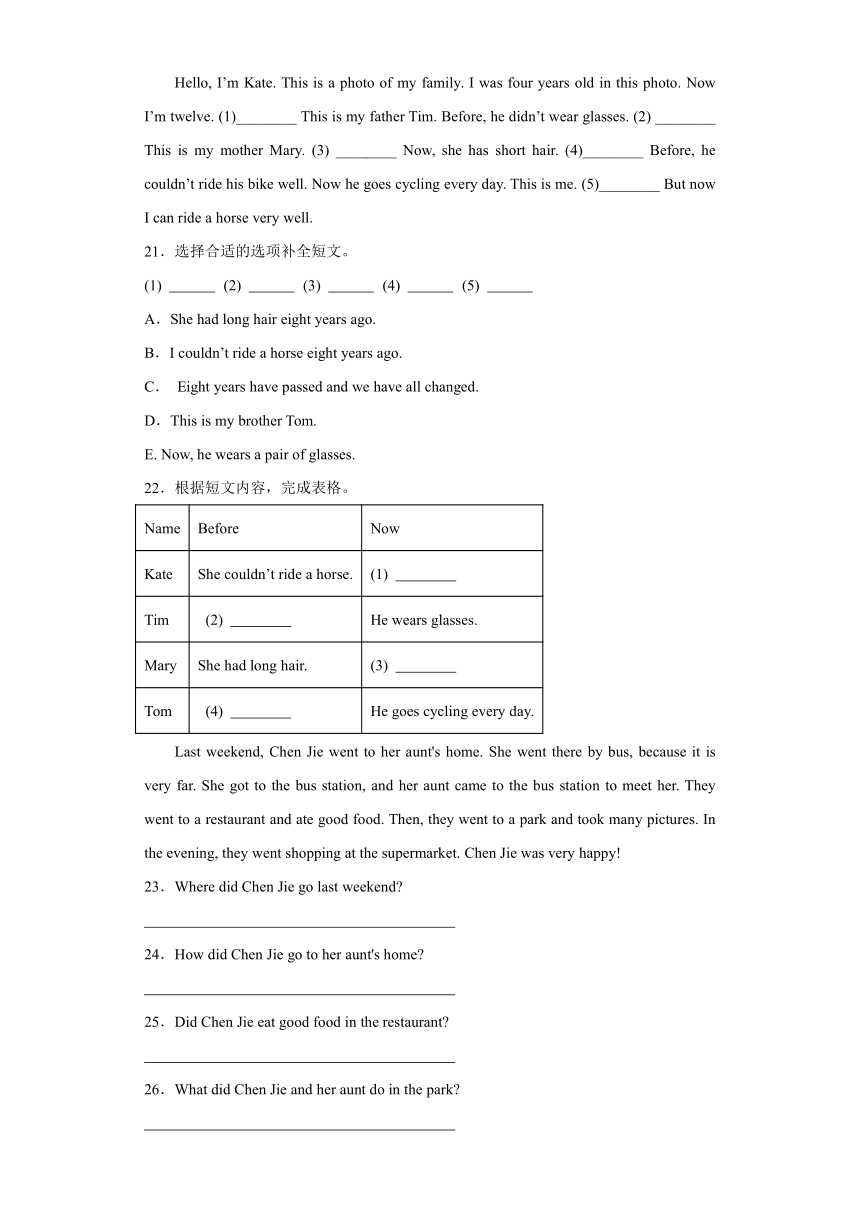2023-2024学年人教PEP版英语六年级下册小升初任务型阅读专题培优练习(含答案)
文档属性
| 名称 | 2023-2024学年人教PEP版英语六年级下册小升初任务型阅读专题培优练习(含答案) |

|
|
| 格式 | docx | ||
| 文件大小 | 24.1KB | ||
| 资源类型 | 教案 | ||
| 版本资源 | 人教版(PEP) | ||
| 科目 | 英语 | ||
| 更新时间 | 2024-04-22 00:00:00 | ||
图片预览



文档简介
小升初任务型阅读专题培优练习人教版英语六年级下册
Hi. I’m Jenny. Last Saturday I went to Hangzhou to see my uncle and aunt. I went there by bus. I got to Hangzhou at about 10:00 in the morning. Then my cousin Tony and I took a taxi to the West Lake(西湖). We went there quickly because my uncle is the taxi driver. We rowed(划)the boat on the lake. It was a hot day. The sun was shining in the sky. We felt hot and hungry. We sat under a big tree and had our lunch. Tony saw a fish in the lake. So we fed(喂养)the fish with bread. More and more fish swam to us and opened their mouths. We were very happy that day.
1.Jenny’s aunt lives in Hangzhou. ( )
2.Jenny went to the West Lake by train. ( )
3.Jenny’s uncle is a taxi driver. ( )
4.They had lunch on the lake. ( )
5.They fed fish with bread. ( )
I am Lucy. Tomorrow is Saturday. I have no classes. My parents aren’t going to work. We are going to take a trip tomorrow. My mom is preparing (准备) for food for the trip. My dad is cleaning the car. I am doing my homework now. So I can enjoy playing tomorrow.
6.What day is it today
7.Is Lucy going to have classes tomorrow
8.Are Lucy’s parents going to work tomorrow
9.What are Lucy’s family going to do tomorrow
10.What is Lucy doing now
Sarah: Tom, let’s go to the park this afternoon.
Tom: Great! But how do we go to the park
Sarah: It’s easy. You can come to my home by bike. Then we can take a No.1 bus to the park. The bus stop is near my home.
Tom: Do you live on the fifth floor
Sarah: No, I don’t. John lives on the fifth floor, I live on the third floor.
Tom: OK! See you at 3 o'clock.
11.When is Sarah going to the park
12.How does Tom go to Sarah’s home
13.How do they go to the park
14.Is the bus stop far from Sarah’s home
15.Does John live on the third floor
Tom was seven years old. He got some money from his parents every week. He bought a lot of things from the shops, but he didn’t need them really. One day his mother gave him a notebook and said, "Now, Tom, when you buy anything. I want you to write it down in this notebook and write down how much you have paid for it, too. Then you can look at it again when your money's all gone, and you won't waste so much money next time. After a week, Tom said to his mother, "Do you know, Mummy, before I spend any money now, I really stop and think.” His mother was very pleased and thought, “Well, he's learned the value of money now.” But she wasn't so happy when he added. “Yes, before I buy anything, I always ask myself, Am I going to be able to spell that in my notebook ”
16.How old was Tom
17.What did Tom get from his parents every week
18.What did his mother give him one day
19.What did Tom do before he spent any money
20.Why wasn’t Tom's mother so happy when Tom added some words
Hello, I’m Kate. This is a photo of my family. I was four years old in this photo. Now I’m twelve. (1)________ This is my father Tim. Before, he didn’t wear glasses. (2) ________ This is my mother Mary. (3) ________ Now, she has short hair. (4)________ Before, he couldn’t ride his bike well. Now he goes cycling every day. This is me. (5)________ But now I can ride a horse very well.
21.选择合适的选项补全短文。
(1) (2) (3) (4) (5)
A.She had long hair eight years ago.
B.I couldn’t ride a horse eight years ago.
C. Eight years have passed and we have all changed.
D.This is my brother Tom.
E. Now, he wears a pair of glasses.
22.根据短文内容,完成表格。
Name Before Now
Kate She couldn’t ride a horse. (1)
Tim (2) He wears glasses.
Mary She had long hair. (3)
Tom (4) He goes cycling every day.
Last weekend, Chen Jie went to her aunt's home. She went there by bus, because it is very far. She got to the bus station, and her aunt came to the bus station to meet her. They went to a restaurant and ate good food. Then, they went to a park and took many pictures. In the evening, they went shopping at the supermarket. Chen Jie was very happy!
23.Where did Chen Jie go last weekend
24.How did Chen Jie go to her aunt's home
25.Did Chen Jie eat good food in the restaurant
26.What did Chen Jie and her aunt do in the park
27.What did Chen Jie and her aunt do in the evening
Dear David,
I will go to New York this summer holiday. I will visit my cousin Simon. I will take a present to him. It’s a dragon kite. I made the kite for him. Simon likes flying kites. I think he will like it very much. We can fly kites in the park together. I’m going to take some Chinese books, too. We can read books in the evening. He will teach me English. And I will teach him Chinese.
Daming. 28.Choose the correct answer.选择正确答案。
(1) Who made the kite ( )
A.David. B.Daming. C. We don’t know.
(2) Who will teach Daming English ( )
A.Simon. B.David. C. His dad.
(3) When can they read books ( )
A.In the morning. B.In the afternoon. C. In the evening.
29.Answer the questions.回答问题。
(1) Where will Daming go this summer holiday
(2) Does Simon like flying kites
John lives in a small village. People often call him “Mr Going-to-do”. Do you know why Because he always says he is going to do something, but never does it.
Every Saturday John goes to the Smiths’ house and talks to Mr Smith. “I’m going to clean my house today,” he says, or “I’m going to wash my car tomorrow.” or “The trees in front of my house are too big. I’m going to cut them down next week. ” Mr Smith usually says, “Are you, John ” He knows his neighbour isn’t going to clean his house, wash his car, or cut down any trees. Then he says, “Well, excuse me, John. I’m going to clean my room today.” And so he does.
Mr and Mrs Smith often say to their only child Dick, “If you are going to do something, then do it. Don’t be another ‘Mr Going-to-do’.”
30.选择填空。
What can we learn from the passage(文章) ( )
A.We should be kind to others.
B.Think it over before you are going to say something.
C. If you want to do something, don’t just say it but do it.
31.阅读故事,判断下列句子是(T)否(F)正确。
(1) John is going to wash his bike on Sunday. ( )
(2) Mr Smith thinks John will clean his room. ( )
(3) Mr Smith really cleans his room on Saturday. ( )
(4) We shouldn’t(不应该) be Mr Going-to-do like John. ( )
参考答案:
1.T 2.F 3.T 4.F 5.T
6.It’s Friday. / Today is Friday. / Friday. 7.No, she isn’t. 8.No, they aren’t. 9.They are going to take a trip. 10.She is doing her homework.
11.This afternoon. 12.By bike. 13.By bus. 14.No, it isn’t. 15.No, he doesn’t.
16.He was seven years old. 17.He got some money from his parents every week. 18.A notebook. 19.He wrote it down in his notebook and wrote down how much he had paid for it, too. 20.Because she thought he hadn’t learned the value of money.
21. C E A D B 22. She can ride a horse very well. He didn’t wear glasses. She has short hair. He couldn’t ride his bike well.
23.She went to her aunt's home. 24.She went there by bus. 25.Yes, she did. 26.They took many pictures. 27.They went shopping at the supermarket.
28. B A
C 29. He will go to New York. Yes, he does.
30.C 31. F F T T
Hi. I’m Jenny. Last Saturday I went to Hangzhou to see my uncle and aunt. I went there by bus. I got to Hangzhou at about 10:00 in the morning. Then my cousin Tony and I took a taxi to the West Lake(西湖). We went there quickly because my uncle is the taxi driver. We rowed(划)the boat on the lake. It was a hot day. The sun was shining in the sky. We felt hot and hungry. We sat under a big tree and had our lunch. Tony saw a fish in the lake. So we fed(喂养)the fish with bread. More and more fish swam to us and opened their mouths. We were very happy that day.
1.Jenny’s aunt lives in Hangzhou. ( )
2.Jenny went to the West Lake by train. ( )
3.Jenny’s uncle is a taxi driver. ( )
4.They had lunch on the lake. ( )
5.They fed fish with bread. ( )
I am Lucy. Tomorrow is Saturday. I have no classes. My parents aren’t going to work. We are going to take a trip tomorrow. My mom is preparing (准备) for food for the trip. My dad is cleaning the car. I am doing my homework now. So I can enjoy playing tomorrow.
6.What day is it today
7.Is Lucy going to have classes tomorrow
8.Are Lucy’s parents going to work tomorrow
9.What are Lucy’s family going to do tomorrow
10.What is Lucy doing now
Sarah: Tom, let’s go to the park this afternoon.
Tom: Great! But how do we go to the park
Sarah: It’s easy. You can come to my home by bike. Then we can take a No.1 bus to the park. The bus stop is near my home.
Tom: Do you live on the fifth floor
Sarah: No, I don’t. John lives on the fifth floor, I live on the third floor.
Tom: OK! See you at 3 o'clock.
11.When is Sarah going to the park
12.How does Tom go to Sarah’s home
13.How do they go to the park
14.Is the bus stop far from Sarah’s home
15.Does John live on the third floor
Tom was seven years old. He got some money from his parents every week. He bought a lot of things from the shops, but he didn’t need them really. One day his mother gave him a notebook and said, "Now, Tom, when you buy anything. I want you to write it down in this notebook and write down how much you have paid for it, too. Then you can look at it again when your money's all gone, and you won't waste so much money next time. After a week, Tom said to his mother, "Do you know, Mummy, before I spend any money now, I really stop and think.” His mother was very pleased and thought, “Well, he's learned the value of money now.” But she wasn't so happy when he added. “Yes, before I buy anything, I always ask myself, Am I going to be able to spell that in my notebook ”
16.How old was Tom
17.What did Tom get from his parents every week
18.What did his mother give him one day
19.What did Tom do before he spent any money
20.Why wasn’t Tom's mother so happy when Tom added some words
Hello, I’m Kate. This is a photo of my family. I was four years old in this photo. Now I’m twelve. (1)________ This is my father Tim. Before, he didn’t wear glasses. (2) ________ This is my mother Mary. (3) ________ Now, she has short hair. (4)________ Before, he couldn’t ride his bike well. Now he goes cycling every day. This is me. (5)________ But now I can ride a horse very well.
21.选择合适的选项补全短文。
(1) (2) (3) (4) (5)
A.She had long hair eight years ago.
B.I couldn’t ride a horse eight years ago.
C. Eight years have passed and we have all changed.
D.This is my brother Tom.
E. Now, he wears a pair of glasses.
22.根据短文内容,完成表格。
Name Before Now
Kate She couldn’t ride a horse. (1)
Tim (2) He wears glasses.
Mary She had long hair. (3)
Tom (4) He goes cycling every day.
Last weekend, Chen Jie went to her aunt's home. She went there by bus, because it is very far. She got to the bus station, and her aunt came to the bus station to meet her. They went to a restaurant and ate good food. Then, they went to a park and took many pictures. In the evening, they went shopping at the supermarket. Chen Jie was very happy!
23.Where did Chen Jie go last weekend
24.How did Chen Jie go to her aunt's home
25.Did Chen Jie eat good food in the restaurant
26.What did Chen Jie and her aunt do in the park
27.What did Chen Jie and her aunt do in the evening
Dear David,
I will go to New York this summer holiday. I will visit my cousin Simon. I will take a present to him. It’s a dragon kite. I made the kite for him. Simon likes flying kites. I think he will like it very much. We can fly kites in the park together. I’m going to take some Chinese books, too. We can read books in the evening. He will teach me English. And I will teach him Chinese.
Daming. 28.Choose the correct answer.选择正确答案。
(1) Who made the kite ( )
A.David. B.Daming. C. We don’t know.
(2) Who will teach Daming English ( )
A.Simon. B.David. C. His dad.
(3) When can they read books ( )
A.In the morning. B.In the afternoon. C. In the evening.
29.Answer the questions.回答问题。
(1) Where will Daming go this summer holiday
(2) Does Simon like flying kites
John lives in a small village. People often call him “Mr Going-to-do”. Do you know why Because he always says he is going to do something, but never does it.
Every Saturday John goes to the Smiths’ house and talks to Mr Smith. “I’m going to clean my house today,” he says, or “I’m going to wash my car tomorrow.” or “The trees in front of my house are too big. I’m going to cut them down next week. ” Mr Smith usually says, “Are you, John ” He knows his neighbour isn’t going to clean his house, wash his car, or cut down any trees. Then he says, “Well, excuse me, John. I’m going to clean my room today.” And so he does.
Mr and Mrs Smith often say to their only child Dick, “If you are going to do something, then do it. Don’t be another ‘Mr Going-to-do’.”
30.选择填空。
What can we learn from the passage(文章) ( )
A.We should be kind to others.
B.Think it over before you are going to say something.
C. If you want to do something, don’t just say it but do it.
31.阅读故事,判断下列句子是(T)否(F)正确。
(1) John is going to wash his bike on Sunday. ( )
(2) Mr Smith thinks John will clean his room. ( )
(3) Mr Smith really cleans his room on Saturday. ( )
(4) We shouldn’t(不应该) be Mr Going-to-do like John. ( )
参考答案:
1.T 2.F 3.T 4.F 5.T
6.It’s Friday. / Today is Friday. / Friday. 7.No, she isn’t. 8.No, they aren’t. 9.They are going to take a trip. 10.She is doing her homework.
11.This afternoon. 12.By bike. 13.By bus. 14.No, it isn’t. 15.No, he doesn’t.
16.He was seven years old. 17.He got some money from his parents every week. 18.A notebook. 19.He wrote it down in his notebook and wrote down how much he had paid for it, too. 20.Because she thought he hadn’t learned the value of money.
21. C E A D B 22. She can ride a horse very well. He didn’t wear glasses. She has short hair. He couldn’t ride his bike well.
23.She went to her aunt's home. 24.She went there by bus. 25.Yes, she did. 26.They took many pictures. 27.They went shopping at the supermarket.
28. B A
C 29. He will go to New York. Yes, he does.
30.C 31. F F T T
